Great Vegetables To Grow on Cape Cod
Great Vegetables To Grow on Cape Cod
Most herbs and vegetables grow well in this region, but some are especially productive, and it’s these that we’ll focus on in this post. For most home gardeners, space is limited so it’s important to maximize your vegetable production in the area you have. Here are plants that are recommended because they grow well on Cape Cod and produce a good harvest.
Tomatoes Everyone wants to grow tomatoes, but where space is limited, pick a variety that will produce well. Heirlooms have great flavor but they aren’t as disease resistant, and frequently aren’t as productive. So if you can only plant two or three, I’d recommend a small or cherry tomato, such as Sun Gold, Sweet 100’s, or Mountain Magic, plus a larger-fruited hybrid such as Big Boy, Better Boy, Celebrity, or Buffalo Sun. You can start tomatoes early from seed yourself or buy plants in May.
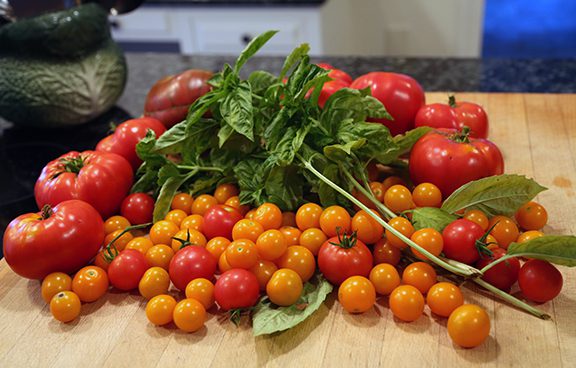
Chard Sometimes called Swiss Chard, this plant is very similar to spinach but the leaves are larger and the plant will last all summer. Harvest the young, small leaves for salad as you thin seed-sown plants to six inches apart. Once thinned, pick the largest leaves from each plant and leave the center leaves to grow. Chard will continue to produce all season when harvested in this manner. Plant chard from seed in early May. Occasionally plants are sold in small pots, but the largest harvests are produced from seed.
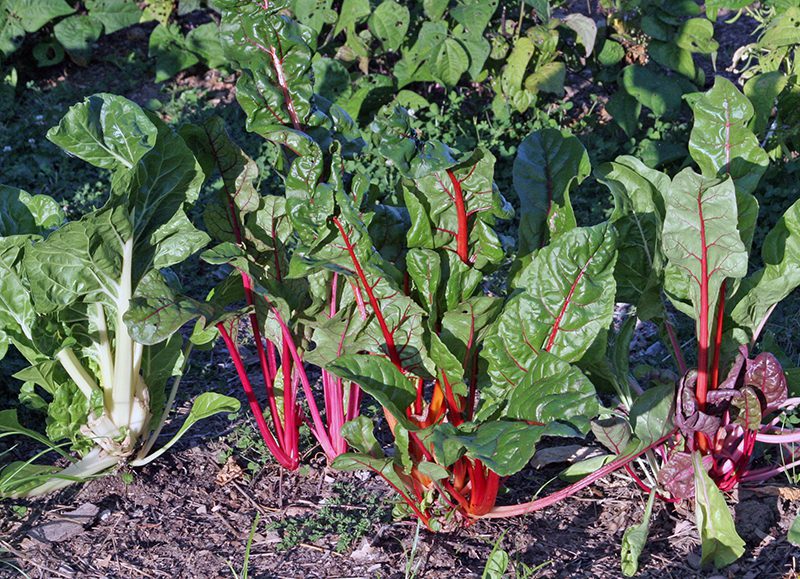
Green Beans Beans grow well in this area, but the key to their continued production, not to mention the best flavor, is to pick them early and harvest every other day. If you’re the type of person who only picks vegetables on the weekend, this isn’t the best one for you to grow. But if you’re willing to go out to the garden and pick beans frequently, your plants will continue to bloom and produce. Although beans are sold in three-packs in late May, they are easy to grow from seed. Plant beans in late-May or early June.
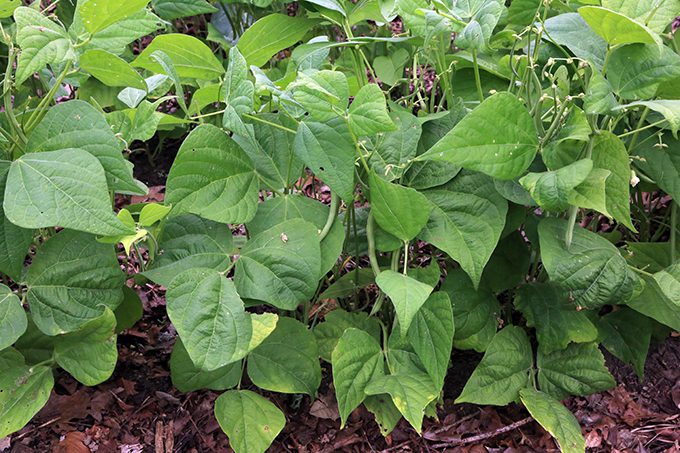
Tuscan Kale This sweet tasting kale will grow tall and continue to produce from early summer through December if you continually harvest the largest leaves from the bottom. If you’ve not been a kale lover in the past, I urge you to grow this variety, also called dinosaur kale, and prepare it by cutting out the central rib and then slicing the greens into narrow ribbons. After cutting the kale in that manner it can be eaten raw in a salad or added to pasta sauces, casseroles, soups or stir-fry. Tip for success: spray kale (and any related vegetable such as broccoli, cabbage and Brussels sprouts) weekly with Captain Jack’s spinosad with Turbo spreader-sticker in the tank. This is an organic control of the larvae of the white cabbage butterfly. If not protected, these small green caterpillars will turn your kale into lace. Hyannis Country Garden always has Captain Jack’s and Turbo in stock.
Grow Tuscan kale from seed that’s either started in April indoors, or sown in the garden in mid-May.

Salad Greens On Cape Cod it’s possible to have salad greens growing all summer and fall. The key is to keep planting them as the season continues, and to harvest young leaves frequently. Try an assortment of lettuce varieties. Arugula also grows well, and can be used in salads, on top of pizzas, or put in with basil when making pesto. Make it a point to put some salad green seeds in the ground at the first of the month, starting in April or May. (Note: seeds sown in cold soils in April will take up to two or three weeks to germinate, but seeds sown in warm soil from June on will sprout in a couple of days.) Although lettuce is sold in six packs for those who want instant gratification, if you’re a big salad eater it is good to buy seeds and start them though the season.
Tip for success: Don’t wait for lettuce to get as large as the ones you buy in the grocery store. Harvest the leaves early and often for the best flavor. Think “baby lettuces” not “head of lettuce.”
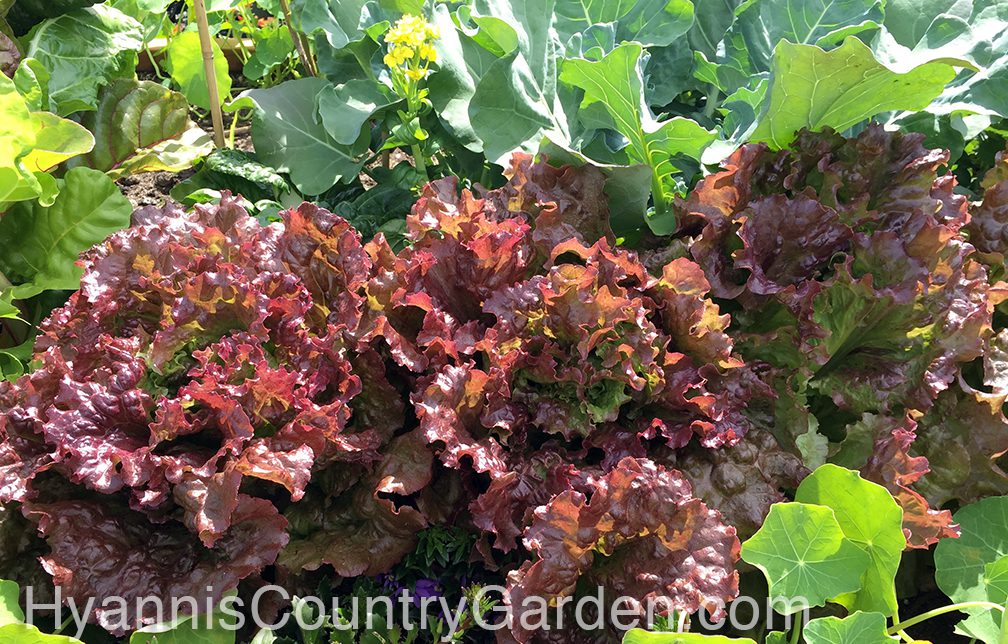
For more produce: If you want to maximize the use of a small space, grow sugar snap peas up a fence or other vertical support, planting the seeds in mid-April. Then plant cucumber plants or seeds at the base of the pea plants in late May or early June. The peas will stop producing in early July, and you’ll remove the plants, leaving that space for the cucumbers to grow. If cucumbers aren’t your food-of-choice, small varieties of winter squash such as Honey Nut or other shorter types can be grown on that same support. Plant these squash from seed planted directly in the garden at the end of May.
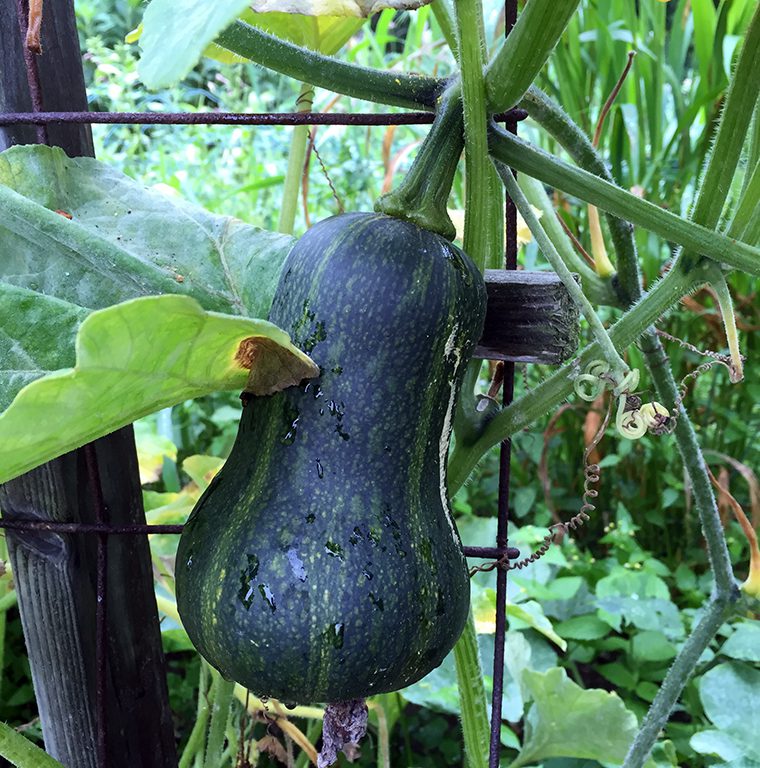
Experiment! After you’ve planted your garden with some known-to-produce varieties, you can try other vegetables or herbs for fun. The one crop you might want to stay away from, unless you have a huge space, are the melons. Melon plants grow large and like a long, hot season (think Texas), so in general they don’t produce as well in our coastal region.
Subscribe To Our Newsletter
Sign up for our weekly email about sales and events.
